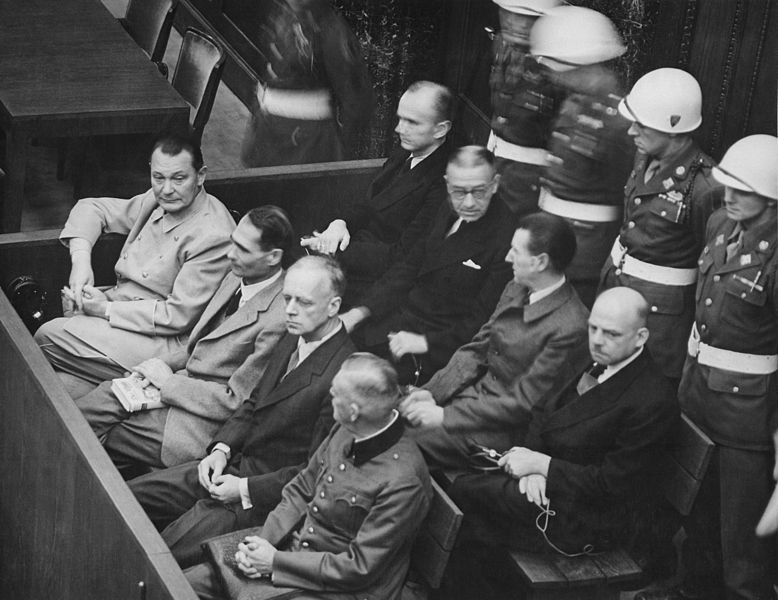The Anglo-American legal tradition is in serious trouble if not a single major U.S. politician is willing to suggest that the most effective way to combat international terrorism is through law and the courts.
Terrorism is a crime under the United States code, defined at 18 U.S.C. §§ 2331 and 2332b . It sits just a few subchapters away from piracy, another international crime which is also adjudicated, relatively successfully, by the U.S. legal system. It is probably tough to remember, but the mastermind of the 1993 World Trade Center attack, Ramzi Yousef, was tried in a civilian court. He is currently serving a life sentence in Florence, Colorado, at a federal Supermax prison.
It would reflect a great deal of strength for a politician to argue that law will dispose of terrorism. First, most of us already know that courts can successfully handle heinous international crimes. At Nuremberg, judges were able to weigh evidence and convict individuals who committed some of the most deeply offensive crimes in history. This work continues in the Hague today with the International Criminal Court. Most international scholars agree that such efforts are largely positive in helping to close the chapter on war and to move a society forward in a more positive, legally-minded direction. If a court was capable of adjudicating the Holocaust, it is surely capable of dealing with international terrorism.
There is strength in affirming fundamental values on which a civilized society is based. We cannot have a world in which some crimes go before a civilian judge, and some crimes are subject to summary execution by the President through a drone strike. In all matters of justice, separate-but-equal is a fatally flawed directive. Historically, the Anglo-American tradition has sought to limit executive power and preserve the ability of a neutral judge to adjudicate disputes — values that have been deeply weakened by 15 years of unending war and which now must be reclaimed or forever lost.
There is strength in admitting that the military approach to terrorism has not only failed, it has made the problem significantly worse. Using a bomb to solve terrorism creates a hydra where chopping off one head only produces three more. Kill Baghdadi and someone else will take his throne, or perhaps three more. Is this not what created ISIS? Is it really so difficult to see how the use of the military in the Middle East has opened the gates of Hell? Is no one really going to question the insanity of the U.S. simultaneously bombing ISIS (fighting Assad) and Assad (fighting ISIS)?
There is strength in dealing with the eventual even-handedness of justice. It is an unfortunate truth that Western countries have also, too, committed crimes since 9/11. Those crimes will require an accounting before a judge, at least some day. And in particular, there will never be peace in the Middle East without an answer for the Iraq War, which will be recognized one day by all peoples as one of the gravest international crimes since World War II. This was a war that was built on lies and sold to a fearful public like the vilest of snake oils. And its bitterness remains. The Iraq War destroyed a country, killed millions of innocent parents and their children, and is the caustic source of the violence that now roils the Middle East and strikes into Paris. Justice requires an answer for the Iraq War — a good and healthy thing as such justice will act as a lesson to the future that the human species will never survive if it relies on war, particularly at a time when so much destruction can be committed by so few in number.
Now, the specter of fascism creeps in this petty pace as politicians in Europe and the U.S. create false enemies and denounce refugees, threaten more war, and pander to the ugliest motivations of each of their respective nations. There is strength in rejecting this fascism.
The world should put together its finest legal minds from all countries — from the U.S., from Latin America, from Europe, from Africa, from Asia, and yes, from the Middle East. Let these minds define the problem, propose a legal solution, and then either work with the International Criminal Court in the Hague, or set up a special tribunal to adjudicate the issue of terrorism. Let that court issue warrants, and make sure that the world will cooperate with that court to arrest those who are wanted. Give the accused a lawyer, have a trial, and issue a sentence. Put the guilty in jail. And acquit those for whom there is not enough evidence, and let them go.
And after the world has set up that process, the world should do the same thing for those on all sides who are committing crimes. All people should take a look at the log in each of their own eyes, particularly after analyzing the speck in that of the other. The people of every nation must look into their hearts and their minds to figure out why governments, everywhere, are getting away with murder. The world needs to put a stop to that, as well.
I know very little about very little. But there is one thing I know to be true, like the light of a thousand suns. The answer to terrorism is law.

